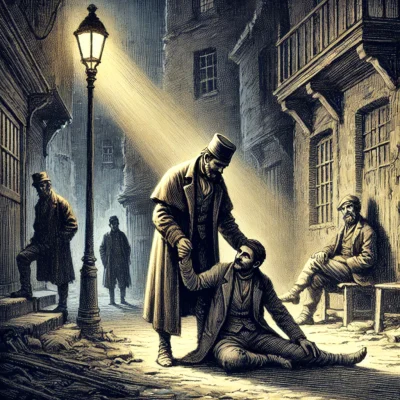1st PUC English Question and Answer—Oru Manushyan
Looking for 1st PUC English textbook answers? You can download Chapter 4: Oru Manushyan Questions and Answers PDF, Notes, and Summary here. 1st PUC English solutions follow the Karnataka State Board Syllabus, making it easier for students to revise and score higher in exams.
Karnataka 1st PUC English Textbook Answers—Reflections Chapter 4
Oru Manushyan Questions and Answers, Notes, and Summary
1st PUC English Chapter 4
Oru Manushyan
Scroll Down to Download Oru Manushyan PDF
Oru Manushyan Comprehension I:
Question 1.
How far was the big city from the narrator’s hometown?
Answer:
It was some thousand-five hundred miles from home.
Question 2.
Where did the narrator stay in the big city?
Answer:
The narrator stays in the city in a very small, dingy room on a dirty street.
Question 3.
For money, people would do anything, even ………….
Answer:
commit murder.
Question 4.
What was the narrator doing to earn a living?
Answer:
The narrator was teaching English to some migrant laborers from nine-thirty till eleven in night.
Question 5.
was considered a great education there.
(a) Learning English
(b) Learning to write an address in English
(c) Writing addresses at the post office.
Answer:
(b) Learning to write an address in English
Question 6.
What reason did the narrator give for sleeping all day and having food in the evening?
Answer:
To save the expense of drinking morning tea or eating the noon meal, the narrator sleeps all day and wakes up at four in the evening.
Question 7.
How much money did the narrator have in his pocket as his life’s savings?
Answer:
The narrator had fourteen rupees in his pocket as his life’s savings.
Question 8.
The man who came forward to pay the narrator’s bill was
(a) a man with a red turban.
(b) a person dressed in a suit.
(c) a money lender.
Answer:
(a) a man with a red turban.
Oru Manushyan Comprehension II:
Question 1.
Describe the people and the place where the incident took place.
Answer:
The people of the city had never been known for the quality of mercy. They were cruel people. Murder, robbery, and pick-pocketing were daily occurrences. By tradition, the people were professional soldiers.
Some of them went to distant places and lent out money on interest. Many others served as watchmen in banks, mills and large commercial establishments in big cities. Money was highly valued by them. For money they would do anything, even commit murder. It was quite a big city in the valley of a mountain, some thousand-five hundred miles from home.
Question 2.
What was the routine of the narrator in the city?
Answer:
The narrator carried on a profession there in the city. He was teaching English to some migrant labourers from nine-thirty till eleven in the night. He taught them to write addresses in English. Learning to write an address in English was considered great education there. He must have seen people who write addresses at the post office.
They were paid anything between one anna and 42 four annas for writing an address. In those days he would sleep all day and wake up at four in the evening. This was to save the expense of drinking my morning tea or eating the noon meal.
Question 3.
Give an account of the embarrassing experience of the narrator at the restaurant.
Answer:
One day the narrator dressed up in a suit. He had a wallet in his coat pocket. He had fourteen rupees in it for his life savings at the time. He entered a crowded restaurant. He ate a full meal consisting of chapattis and meat curry.
He drank tea as well. The bill came to eleven annies. He put his hand in his coat pocket to pay for it. He was embarrassed that his wallet was not there. Someone has picked up his pocket and taken away his wallet.
Question 4.
A stranger saved the day for the narrator. How?
Answer:
As the narrator lost his money, he had no hope of escaping from the restaurant. At last, he heard a voice saying, He should pay the money. There stood a fair- fair-complexioned man, six foot tall, with a red turban and white trousers. He sported a handlebar moustache and had blue eyes. He paid eleven annas.
Oru Manushyan Comprehension III:
Question 1.
Does this story talk about transformation in a person? Discuss.
Answer:
The narrator had no definite plans or goals for his life. He was wandering around far away from home. The great change in the life of the narrator that took place was that one day the narrator went to a big city in the valley of a mountain, some one thousand five hundred miles from home. The inhabitants of which had never been known for the quality of mercy.
He stayed in that city in a very small, dingy room on a dirty street. He taught the migrant laborers from nine-thirty till eleven at night there. Before he had no job, then he was very busy teaching the migrants to write addresses.
The people were paid anything between one and four annas for writing an address. The narrator had a good job to give education. This is a good transformation in his life especially.
Question 2.
Do you think the restaurant keeper was overreacting when the narrator could not pay the bill? If so, what accounts for his behaviour?
Answer:
The restaurant keeper should be funny. He ridiculed the narrator in front of the customers. About fifty people doubted along with the restaurant keeper that he must have something on underneath. His behaviour is completely embarrassing.
Oru Manushyan Summary
“Oru Manushyan” (translated as “A Man”) is a short story written by Vaikom Muhammad Basheer, a famous Malayalam writer. The story explores themes of humanity, kindness, and the intrinsic goodness present in people, regardless of their circumstances.
The story is set in a small town in a foreign country where the narrator, an Indian man, is living. He works in a firm but struggles financially due to low wages. One day, after collecting his salary, he goes to a crowded restaurant to have a meal. The atmosphere in the restaurant is tense, filled with suspicious-looking people, which makes the narrator uneasy.
After finishing his meal, the narrator realizes he has been pickpocketed and has lost all his money. As he helplessly watches the situation, he anticipates being humiliated by the restaurant owner for not being able to pay. Just then, a stranger steps in and pays the bill for him. The stranger does not expect anything in return and disappears into the crowd after saving the narrator from a potentially embarrassing situation.
The narrator is moved by this act of kindness from a stranger in a foreign land. The story concludes with the narrator reflecting on the goodness in people, regardless of the tough exterior they may present to the world.

